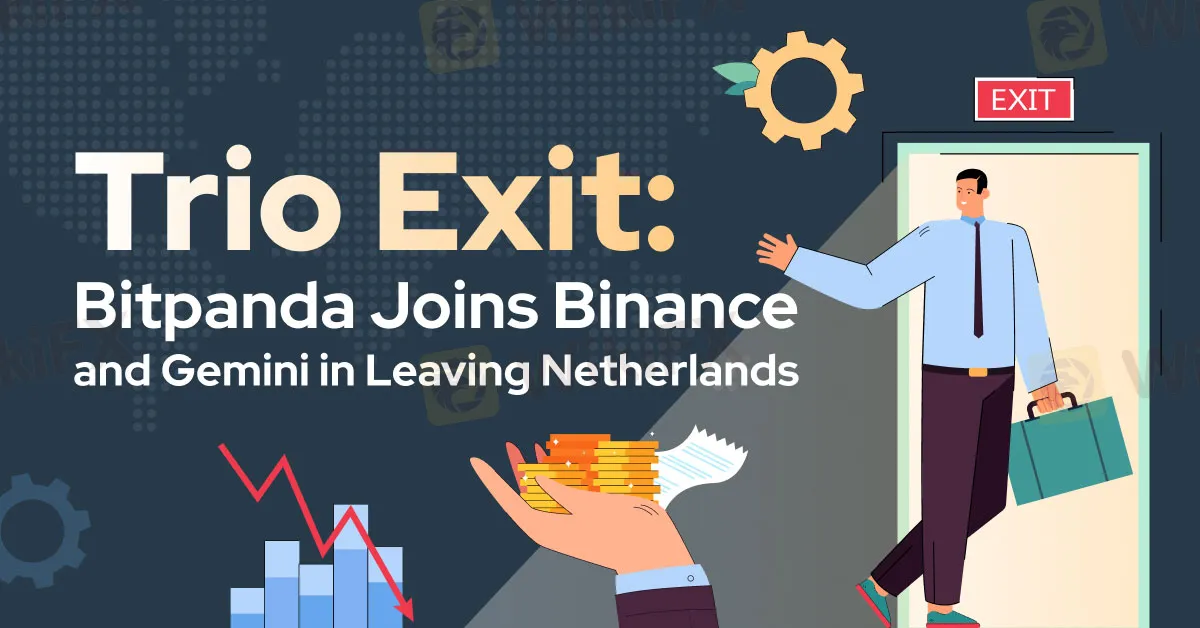PU Prime Launches “The Grind” to Empower Traders
Discover PU Prime’s new campaign, “The Grind,” and learn how trading discipline builds long-term success. Watch and start your trading journey today!
简体中文
繁體中文
English
Pусский
日本語
ภาษาไทย
Tiếng Việt
Bahasa Indonesia
Español
हिन्दी
Filippiiniläinen
Français
Deutsch
Português
Türkçe
한국어
العربية
Abstract:The cryptocurrency exchange Bitpanda, headquartered in Austria, has strategically opted to cease its operations in the Netherlands from February 1, 2024.

The cryptocurrency exchange Bitpanda, headquartered in Austria, has strategically opted to cease its operations in the Netherlands from February 1, 2024, citing the absence of regulatory approval as the primary reason. This decision, conveyed through recent user communications, is a direct response to the regulatory landscape in the country.
Starting February 1, Bitpanda will not accept new users from the Netherlands. Existing users will only have the capability to withdraw assets, with restrictions on additional purchases, trades, or deposits.

Despite catering to over 4 million users across Europe and holding a dozen European licenses, Bitpanda finds itself unregistered with the central bank of the Netherlands, De Nederlandsche Bank (DNB).
To facilitate a smooth transition for Dutch users, Bitpanda recommends the transfer of cryptocurrencies to Bitvavo. Founded in 2018 and located in Amsterdam, Bitvavo complies with Dutch regulatory requirements as a member of the Dutch Association of Bitcoin Companies. As an added incentive for users transitioning from Bitpanda, Bitvavo currently offers a €10 bonus for new users.
As a member of the European Union, the Netherlands falls under the recently enacted Markets in Crypto Asset (MiCA) legislation, enabling companies to secure a single license in one EU country and operate across the entire union.
Bitpanda's withdrawal mirrors a similar move by Gemini, founded by Cameron and Tyler Winklevoss, who also discontinued services to Dutch customers, citing regulatory requirements from the Netherlands' central bank. However, Gemini expresses intentions to re-enter the Dutch market after aligning its operations with the new regulatory guidelines outlined in the MiCA regulations.
In a parallel development, Binance exited the Netherlands in June, attributing the decision to the rejection of its application to register under the Dutch crypto authorization regime. The inability to obtain registration as a virtual asset service provider (VASP) with the Dutch regulator led to the discontinuation of services for clients in the country.
In a noteworthy restructuring earlier in 2023, Bitpanda underwent a split, resulting in two distinct entities. The cryptocurrency exchange, Bitpanda Pro, has transformed into an independent entity known as One Trading. This strategic split aims to intensify the focus on the development and growth of Bitpanda Pro, with additional funding intended to enhance the capabilities and offerings of One Trading in the cryptocurrency market.

Disclaimer:
The views in this article only represent the author's personal views, and do not constitute investment advice on this platform. This platform does not guarantee the accuracy, completeness and timeliness of the information in the article, and will not be liable for any loss caused by the use of or reliance on the information in the article.

Discover PU Prime’s new campaign, “The Grind,” and learn how trading discipline builds long-term success. Watch and start your trading journey today!

IG boosts FCA compliance by integrating Adclear’s AI tools. Learn how automation accelerates marketing approvals and ensures regulatory accuracy.

The Indian Finance Minister Nirmala Sitharaman, while announcing the Union Budget 2026-27, proposed a sharp rise in the Securities Transaction Tax (STT) on Futures and Options as part of the government’s strategy to soothe the country’s overheated derivatives market. The move comes on the backdrop of regulators’ concerns over excessive speculation in F&O allowing retail traders to enter the market and lose capital. Whether the government will be able to curb excessive speculation in F&O through this move remains to be seen. The stock indices, however, were hit hard, with the BSE Sensex falling by 1500 points amid widespread selling on the STT hike. Let’s examine the potential impact of this hike on Indian F&O traders.

Join forex expert Tom as he shares his journey, trading wisdom, and thoughts on AI and the future of forex in WikiFX’s inspiring “Inside the Elite” interview.
